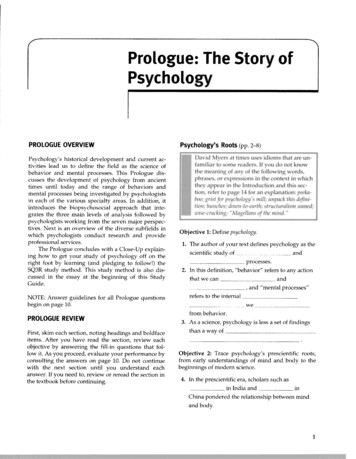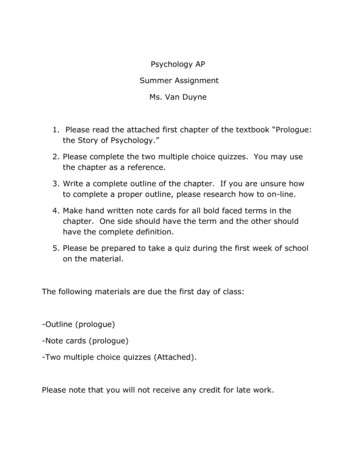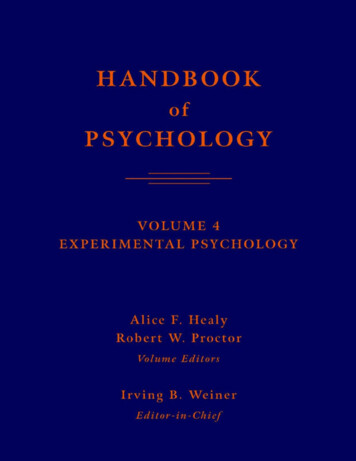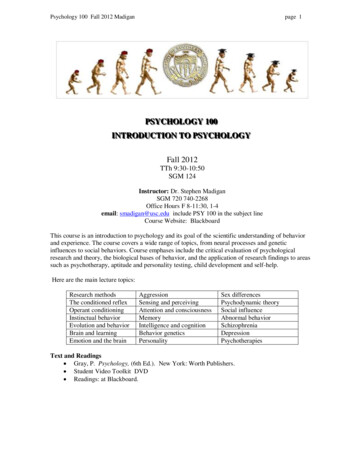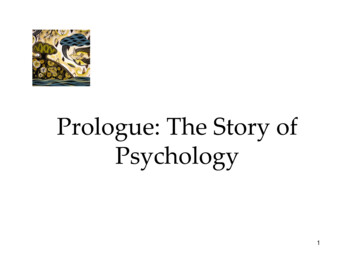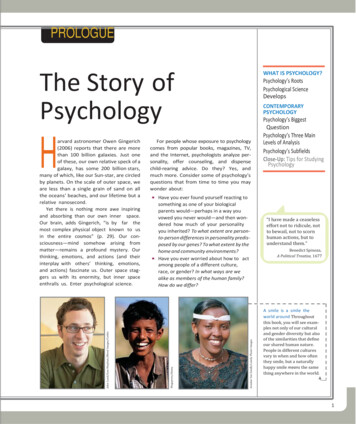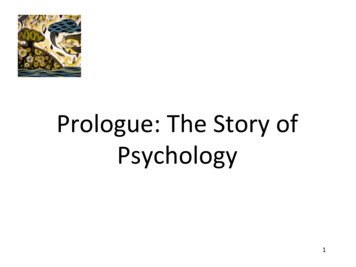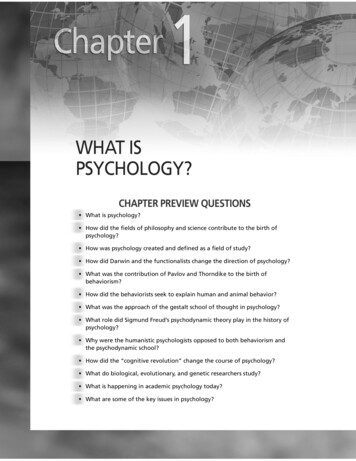
Transcription
WHAT ISPSYCHOLOGY?CHAPTER PREVIEW QUESTIONS What is psychology? How did the fields of philosophy and science contribute to the birth ofpsychology? How was psychology created and defined as a field of study? How did Darwin and the functionalists change the direction of psychology? What was the contribution of Pavlov and Thorndike to the birth ofbehaviorism? How did the behaviorists seek to explain human and animal behavior? What was the approach of the gestalt school of thought in psychology? What role did Sigmund Freud’s psychodynamic theory play in the history ofpsychology? Why were the humanistic psychologists opposed to both behaviorism andthe psychodynamic school? How did the “cognitive revolution” change the course of psychology? What do biological, evolutionary, and genetic researchers study? What is happening in academic psychology today? What are some of the key issues in psychology?
2THE SCIENCE OF PSYCHOLOGY RaygorDEFINING PSYCHOLOGYWhat do you think of when you hear the term “psychology?” Many people picture a person reclining on a couch spilling deep personal secrets to a psychotherapist. My students are often surprised when they find out that I’m nota psychotherapist as well as a psychology instructor. Like many psychologists,I have no training in psychotherapy.Some people also imagine that psychologists have secret insights into theminds of others. When I tell people at social gatherings that I am a psychologist, they often respond by saying, “I’ll have to watch what I say.” They thinkthat my knowledge of psychology will allow me to figure out things about themthat they would rather keep hidden. I’ve lost count of the number of times people have said, “I bet you’re trying to figure out what I’m thinking.” This is a little like meeting a person at a party who works as a server in a restaurant andsaying, “I bet you’re trying to figure out what I’d like to eat.”Human behavior is complex and difficult to predict. If psychologists dohave an edge at understanding human behavior, it is a very small one. There isno evidence, for example, that psychologists are especially skilled at poker, politics, or retail sales. In addition, psychologists, like those in any other occupation, do not all have the same interests and abilities. As we’ll see later in thischapter, psychology covers many topics. Psychologists study anything thatcomes under the broad heading of human and animal behavior. Some do perform psychotherapy. Others, however, may study the visual system, learning inanimals, memory, the brain, or hundreds of other topics. The one thing that allpsychologists agree on is that psychology is a science. Like physics, chemistry,and astronomy, psychologists use the scientific method to understand theworld around them.Q: Isn’t psychology just common sense in a fancy outfit?Every psychology teacher has to fight against the widespread view that psychology is mainly just common sense. First, we should recognize that commonsense has never been a very good guide to scientific truth. For hundreds ofyears, common sense told doctors that draining a person’s blood could curemost common diseases. It told astronomers that planets were just wanderingstars. It told scientists and lay people alike that the sun went around the earthand that the earth was flat. Our common sense now tells us that these ideas arefalse. It is not our common sense that has improved, however. Our commonsense on these topics is now based on scientific research. In every age, ideasbased on scientific evidence have won out over competing ideas based on common sense.Sometimes, psychological theories do appear to be simply fancy expressions of common sense. This is because ideas with solid scientific support always look reasonable in hindsight. Once we have the scientific evidence, it’stempting to say that an idea was “obvious.” Before the scientific evidence is collected, though, common sense often leads us to false conclusions.Another serious problem with common sense is that what it tells us variesfrom person to person. Today, common sense tells some people that we willbe safer if more of us carry guns with us when we go out in public. It tells others that having more guns around will make us less safe. As states debate newlaws about carrying concealed weapons, the newspapers are full of letterscontaining appeals to common sense on both sides of this issue. The questionis a scientific one, however, and it is difficult to answer. Only carefully designed scientific research can tell us which side is correct. Because science isthe best way to find out the truth, we all need to be scientists when we try to
What Is Psychology? 3CHAPTER 1understand the world around us. We’ll talk more about the scientific techniques we can use to gather and interpret information in Chapter 2 when wediscuss methodology.If you still think that psychology is “mostly just common sense,” you might trya scientific test of your theory. Don’t read the book or attend any lectures and useyour common sense while taking your psychology tests. I should warn you, however, that I’ve seen this experiment tried many times over the years. Students whouse this method usually drop the class after failing the first test by a wide margin.Q: So, if psychology isn’t common sense, what is it?We can define psychology generally as the scientific study of behavior and experience. We should point out, though, that this has not always been the definitionof psychology. Psychology is a particularly young science. It is just a little over100 years old. Physics, chemistry, and astronomy, for example, have beenaround for thousands of years. Because psychology is so young, it is still in theprocess of being defined. To truly understand what psychology is, and might become, we need to look at its history. We also need to examine the forces (manyof which have historical roots) that are influencing today’s definition of thefield. In this chapter, we’ll look at psychology’s roots, the important scientific issues facing contemporary psychologists, and the various areas in which modern psychologists specialize. As you read this chapter and the next one, try tokeep in mind that psychology is as much a scientific method as a field of study.To understand how psychology is defined, we must look at two things. First, weneed to understand what areas psychologists study. Equally important, however, is an understanding of the methods psychologists use to study those areas.Both of these have changed over the course of psychology’s history. They continue to change today. That’s why you must look at psychology’s history to understand current events in psychology. Psychologists are involved in a widevariety of careers. All of them share the assumption that the principles of scientific investigation are the best approach for understanding human behavior.Applicationsbasic researchResearch aimed at developingor testing theories which mayor may not have practicalapplicationsapplied researchResearch aimed at findingpractical solutions toimmediate problemsCAREERS IN PSYCHOLOGYPsychology is a particularly wide field. Although manypeople think of psychologists as therapists, only about 55percent of all psychologists are in the areas of clinical orcounseling psychology. Clinical psychologists focus on serious mental problems. They either treat those problemsor do research on them. Counseling psychologists helppeople with less serious problems. A counseling psychologist might help a person plan a career, deal with unemployment, or decide which college courses to take.Over 40 percent of psychologists work at colleges oruniversities. Some are clinical or counseling psychologistsbut many of them study one of the many other topics covered in this text. Most of these academic psychologists areresearchers performing either basic or applied research.Basic research seeks knowledge for the sake of knowledge. Itis usually concerned with theory rather than practical prob-lems. Applied research, on the other hand, seeks answers toimmediate practical problems. A basic researcher, for example, might try to develop a theory about how people processwritten language as they read. An applied researcher in thesame field, however, would be more likely to study whichtechniques are most effective in teaching people to read.The American Psychology Association has 47 separate divisions. Each division represents a particular areaof study in psychology. We can’t cover all 47 here, butTable 1.1 includes some of the more common specialties. Figure 1.1 shows the percentage of psychologistsworking in various categories. You can learn moreabout the various things psychologists do in CareerPaths in Psychology (Sternberg, 1997).(continued)
4THE SCIENCE OF PSYCHOLOGY RaygorCAREERTYPICAL TASKSAcademic psychologistTeaching classes, conducting research, and advising students at a college oruniversity; developing theories to explain the basic processes of learning,sensation, perception, motivation, emotion, personality, etc.Clinical psychologistDiagnosing and treating people with psychological problems or doing research onmental disordersConsumer psychologistConducting public opinion or marketing polls; testing the effectiveness ofadvertising or marketing techniquesCounseling psychologistCounseling people about their problems, choices, or conflictsCommunity psychologistWorking in a community health center; providing preventive mental health care,consultation, and education.DevelopmentalpsychologistDoing basic research on child and adult development and aging; consulting withparents, schools, and senior care facilitiesEnvironmentalpsychologistStudying the psychological and social effects of urban crowding, noise and airpollution, and social problems. Consulting with companies, schools, andconstruction companies on how to design effective environments for work,learning, or housingForensic psychologistConsulting with law enforcement; testifying at trials; studying methods of crimeprevention and rehabilitation of criminals; helping screen candidates for policework; profiling dangerous ing with business and industry; selecting job applicants; assigning new hires tothe appropriate jobs; improving work environments and developing incentiveprogramsSchool psychologistIdentifying and treating learning disabilities; providing counseling andpsychological testing for studentsTABLE 1.1CAREERS IN PSYCHOLOGYFIGURE 1.1PERCENTAGESOF PSYCHOLOGISTS IN VARIOUS CAREER AREAS (APADATA, 1992).As you can see from thisfigure, manypsychologists are incareers that do notinvolve clinical orcounseling psychology(APA data, 1992)Source: In document Title:Percentage of Psychologists inVarious Career Areas.
What Is Psychology? CHAPTER 15PSYCHOLOGY’S ROOTSBecause psychology is such a young science, we don’t have to look that far backto examine its roots. Before there were psychologists, people studied and discussed things that, today, would be part of psychology. In this section, we’ll lookfirst at a brief overview of the history of psychology. Then we’ll examine the major events of that history in more detail. Don’t worry if you don’t understandeverything in the overview. We’ll cover the same topics again in the followingsections.History of Psychology—A Brief OverviewThe two main roots of psychology are philosophy and science. Philosophers likeAristotle, René Descartes, Gottfried Wilhelm Leibnitz, and John Locke, discussed the mind and its relationship to the body. You may not know it, but psychology arose as a branch of philosophy. Until the mid-1900s at many colleges,psychology was still closely associated with philosophy. Some psychologists,like William James, were known for their contributions to philosophy. It is nosurprise, then, that before the birth of psychology, philosophers discussedmany issues that today are part of the field of psychology. Perception, learning,emotions, memory, and the relationship between the mind and the body, for example, were all popular topics for philosophy.While the philosophers were wrestling with important psychological issues, scientists began to realize that the best way to understand the world wasthrough scientific experiments. Because they were forced to use their senseswhile performing these experiments, they became interested in the workings ofthe senses and physiology in general. This led scientists like Ernst Weber, Gustav Fechner, and Hermann von Helmholtz to study the brain and the nervoussystem. These two trends, the study of the mind, and the interest in science andthe nervous system came together in Wilhelm Wundt, who founded the field ofpsychology in 1879.Soon after the birth of psychology, various schools of thought arose in thefield. A school of thought (also called a perspective) is a particular view of themethods and areas of study that are appropriate for the field. Members of aparticular school of thought tend to agree with each other on important topics in psychology and disagree with members of other schools of thought. It isimportant to understand the various schools of thought in psychology becausetheir approaches still influence psychology today. We’ll discuss the variousschools of thought and how psychology changed after its birth in 1879 inmore detail later in this chapter. For now, let’s take a look at where psychology came from.Pre-Psychology Philosophers and ScientistsPeople probably discussed psychological issues long before recorded history.Our prehistoric ancestors must have discussed dreams, mental problems, sexuality, learning, and dozens of other topics that are now part of psychology.They probably took some of these topics more seriously than we do today. Insome prehistoric cultures, the survival of a whole community might depend onlearning how to hunt or how to fight. There must have been serious argumentsabout how those subjects should be taught. Unfortunately, we h
Applications CAREERS IN PSYCHOLOGY basic research Research aimed at developing or testing theories which may or may not have practical applications applied research Research aimed at finding practical solutions to immediate problems (continued) understand the world around us. We’ll talk more about the scientific tech- niques we can use to gather and interpret information in Chapter 2 when we .
